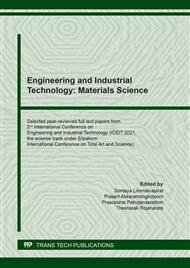p.141
p.149
p.155
p.163
p.169
p.175
p.181
p.187
p.193
The Recycling Feasibility of Disposable Face Masks by Compression Molding
Abstract:
Disposable face masks which are used to prevent the massive spreading of Covid-19 infection, will be new plastic wastes, causing environmental problems. The purpose of this study was to investigate the potential processability of recycling disposable masks, composing of structural layers of nonwoven polyolefin fabrics by compression molding and grinding before melt recycling. It was found that the disposable masks used in this research, composed of 3 layers of polypropylene nonwoven with different fabrication methods but they had a similar melting temperature (Tm) thus provided the possibility of melt processing after removing accessories such as rubber strap and metal wire. The compressed mask sheets made from 1, 3 and 10-stacking sheets of disposable masks were subjected to the grinding analysis by ImageJ program to investigate the particle size distribution. Mechanical and physical properties as well as morphology study of the compressed mask sheets were further analyzed. The tensile strength and elongation at break of compressed mask sheets in horizontal direction were higher than that of the compress mask sheets by vertical direction due to a folding pattern of the disposable masks. The fracture surface of the compressed mask sheets was hard and brittle thus they were suitable for grinding process. Image analysis histogram showed that the grinding condition of 5 minute-cutting time of the compressed 10-stacking mask sheets provided smaller and uniform particles while the 1-stacking mask sheets had larger particle size after grinding due to their thinness which causes them slip through cutting blade. Grinded compressed masks had potential recyclability for melt blending with neat polypropylene at various blending ratios.
Info:
Periodical:
Pages:
169-174
DOI:
Citation:
Online since:
March 2022
Keywords:
Price:
Сopyright:
© 2022 Trans Tech Publications Ltd. All Rights Reserved
Share:
Citation:


